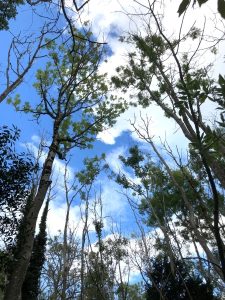Summary
Ash dieback has proved to be a devastating disease and has been responsible for destroying vast numbers of ash trees across Europe since the first disease symptoms were noted in the early 1990s. The disease is caused by a fungus, which when it was first described in 2006 was named Chalara fraxinea, although since then it has gone through various name changes including Hymenoscyphus pseudoalbidus, but the agreed name that is now used consistently is Hymenoscyphus fraxineus. The earlier name of Chalara has become fixed as the common name for the fungus that causes ash dieback.

Ash dieback disease was first identified in woodlands the UK in 2012. Since then, it has been found at hundreds of sites throughout Britain and Ireland. Many of those early findings were in the east of Britain, in counties such as Kent and Norfolk, with evidence that windblown spores from ash dieback-affected locations on mainland Europe initiated the disease in eastern Britain. However, well over half of the findings in 2012 were also associated with recent tree plantings established during the previous 5 or 6 years, suggesting that plant trade had also aided the arrival of this disease. Additionally, we now realise that H. fraxineus was present in Britain well before the first formal reports in 2012 as close examination of some ash sites planted in the 1990s has revealed that at least some of the young stock developed symptoms soon after planting. On that basis, it has been possible to date the presence of H. fraxineus in Britain to at least 2004.
It is likely that resistance (sometimes also called tolerance) to ash dieback will evolve in the UK ash population over time through natural selection. Already some individual trees of Fraxinus excelsior (European ash) are surviving with minimal signs of being affected by the disease, despite repeated expose to the pathogen. This poses an important challenge for forest scientists: how to understand and accelerate the process of resistance to ash dieback, so it becomes widespread and the UK’s ash population can recover more rapidly.
Since 2012, after the discovery of ash dieback in the UK, Forest Research has been actively involved in work to understand the characteristics and behaviour of the ash dieback pathogen H. fraxineus and the effects of the disease on ash populations in this country. This important work has included tolerance/resistance trials, investigations of pathogen sporulation and infection strategies, and a focus on the ecology and pathology of ash dieback disease. All of the knowledge gained is essential for more accurate disease modelling and improved disease management. Details of completed and current work on ash dieback can be found through the links below.
Completed and current work on ash dieback
- Genetic variation in the ash dieback pathogen
- Ecological genetics of the ash dieback pathogen
- Testing a range of ash species for tolerance to Chalara
- Pest Organisms Threatening Europe (POnTE) – including Hymenoscyphus fraxineus
- Ecology and Pathology of Ash Dieback Disease
- Living Ash Project (Phase 2)
